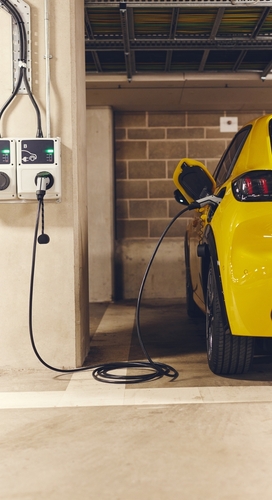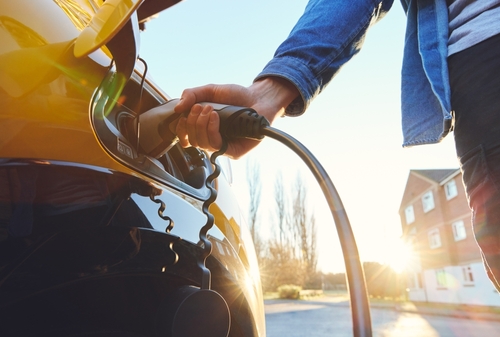EV Car Charger Installation Services
EV Car Chargers
Electric vehicles and EV car chargers paired with renewables are crucial for sustainable transportation. EVs are eco-friendly, reducing emissions and air pollution. Connecting EV chargers to solar or wind power enables a clean and sustainable transportation system.
This has been successfully implemented in various locations, such as Sheffield’s solar PV, storage, and EV charging hub, and near Reading’s football stadium with a wind turbine-linked charging station.
Home charging is the most common method, which is convenient and ideal for households with solar panels. It helps efficiently utilise solar-generated electricity and reduce costs and emissions.
Solar-powered offices, like WWF, also benefit from EV charging. As EVs increase, workplace charging becomes more important.

Electric Vehicle Charger Renewable energy
Using renewable energy to charge electric vehicles (EVs) reduces transportation-related carbon emissions. Solar panels and wind turbines generate clean electricity, which can be directly used for EV charging, promoting an environmentally friendly approach.
Integrating EV charging infrastructure with renewables also eases pressure on the electrical grid. Charging during peak hours strains the system, but by leveraging renewable energy, charging can occur when renewable generation is high.
This reduces grid demand and optimises energy usage. Moreover, combining EV chargers with renewables fosters energy independence. Decentralised charging stations can be established, lessening reliance on fossil fuels and enabling communities to generate their own clean energy.
In summary, the coupling of EV chargers with renewables is essential for sustainable transportation, driving us towards a future with reduced emissions, cleaner air, and enhanced energy efficiency.
How long will my EV take to charge?
The time it takes to charge an electric vehicle (EV) depends on several factors, including the capacity of the EV’s battery, the charging speed of the charging station, and the current state of charge of the battery.
Here are the general charging speed categories and the approximate charging times associated with each:
Slow Charging
This is typically done using a standard household outlet or a dedicated EV charging unit with a lower power output. Slow charging is the most common method used for overnight charging.
It can take several hours to fully charge an EV, depending on the battery size and charging rate. The exact time will vary, but it can range from 8 to 20 hours or more.
Fast Charging
Fast charging stations are more powerful and can charge an EV at a significantly higher rate than slow chargers. With fast charging, an EV can gain a substantial amount of range in a shorter time. It usually takes a few hours to charge an EV using a fast charger, with charging times ranging from around 2 to 6 hours.
Rapid Charging
Rapid charging, also known as DC fast charging, is the fastest charging option available for EVs. These chargers provide a high-power DC current directly to the vehicle’s battery, enabling rapid charging.
With a rapid charger, an EV can charge to 80% or more in approximately 30 minutes. However, it’s important to note that the charging speed may slow down significantly after reaching 80% to protect the battery.
It’s worth mentioning that charging times can vary between different EV models and charging infrastructure. Additionally, advancements in charging technology are continuously being made, resulting in faster charging speeds and reduced charging times.
Electric Vehicle Chargers at Penningtons
When considering the installation of electric vehicle (EV) chargers, engaging a consultant can greatly benefit the process. A consultant experienced in EV car chargers brings expertise in assessing site feasibility, determining optimal charger types and configurations, and navigating regulatory requirements.
We can help evaluate power capacity, recommend suitable charging speeds, and devise efficient charging infrastructure plans. Furthermore, our consultants can aid in selecting reliable and compatible charging equipment, ensuring a smooth integration with existing electrical systems.
Our knowledge of industry standards and emerging technologies enables informed decision-making, maximising the effectiveness and future-proofing of EV charging installations. Ultimately, enlisting a consultant streamlines the process, minimises risks, and facilitates the successful implementation of EV car chargers.

Whatever your requirements, when it comes to EV Car Chargers, it’s always best to get expert advice and expert installation.
Call 01932 259 620 or Email info@penningtonsgroup.co.uk
